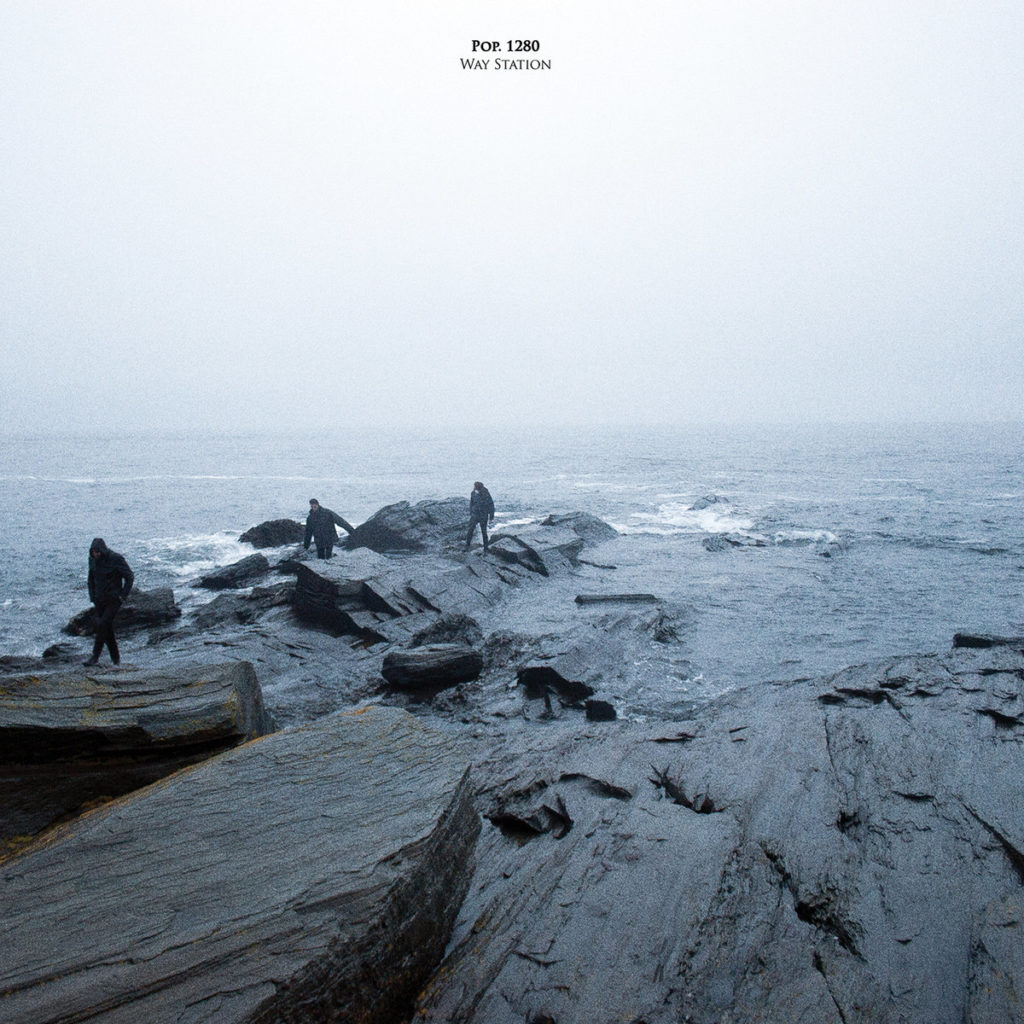
As last year came to a close, we had reason (courtesy of Vomit Fist’s excellent Omnicide) to reflect on the way that New York seems to have a remarkable influence over the artists that reside there. It’s one of those cities that draws in a wide range of artists and yet what emerges is not so much a coherent sound in the way that you find in, for example, South California, but an underlying philosophy that sees artists pushing beyond the boundaries of their chosen genre to explore hitherto untapped realms. This is certainly the case with Pop. 1280, whose new album, Waystation emerges on Boom Operator as a bad acid trip at a BDSM club and only becomes more unhinged from there. A trio, Pop. 1280 comprises Ivan Drip (guitar, synth, drum machines & Piano), Chris Bug (vocals, samples and synth) and Matthew Hord (synth). However, if a line-up that predominantly revolves around synths sounds like a soft option, listeners will soon be encouraged to think again as the album savages their eardrums. As the likes of Al Jourgenson and Trent Reznor will tell you, it’s not the tools that matter, but the intent; and here the intent is borderline sociopathic.
Opening with the aforementioned Boom Operator, Pop. 1280 apply the principles of the British post-punk movement – rigid discipline, a firm grasp of atmosphere – to the hellish melee of early Swans, the tinny drum machines only serving to emphasise the searing misanthropy of Chris Bug’s Gira-meets-Coleman vocal delivery. With sheet metal guitars and a pulverising rhythm, Boom Operator is an unexpectedly visceral opener but it’s only partially indicative of what’s to come for, instead of applying a one-dimensional assault, the band have a number of tricks within their sonic arsenal. As such, the trip-hop-gone-wrong of Under Duress sounds like vintage Nine Inch Nails tackling Amebix and Fields of the Nephilim, Chris’ worn vocal more reminiscent of a dust-covered Western than a Gothic nightmare. A short, filmic segue in the form of The Convoy does absolutely nothing to help repair shattered nerve endings and, in some senses, the stuttering industrial noise of the ironically-titled Doves comes as something of a relief. Another sonic side-step sees the band indulging in yet more post-punk antics with Hospice, a coldly melodic piece of music that leads neatly to the industrial horror of Monument, a grueling, four-minute piece that seems to stretch into infinity as ambient noise collides with a cacophonous backdrop worthy of Filth. It is an unbelievably harrowing piece of music and worthy of the price of admission alone.
Opening the album’s second half, the hollowed-out ambience of Empathetics recalls the future-retro soundtracks of John Carpenter and Basil Poledouris, rendered all the more toxic by Chris’ horror-stricken vocal delivery. Delivered with the fervour of a manic preacher, Leading The Spider On, sees the band exploring the neo-Western themes of Under Duress, before a moment of surprising beauty in the form of The Deserter draws the listener towards Home Sweet Home. As with Doves, Home Sweet Home sees the band take the most innocuous of titles and imbue it with sinister meaning, the track recalling the death march of The Great Annihilator-era Swans (if you’ve heard the live version of I Am The Sun, you’ll know what I mean). Built around a plodding, single note bass-line, Home Sweet Home is a showcase for Chris’ wild-eyed delivery and, when it comes to a sudden end, it’s as if a pall has lifted and the light can filter back into your life once more. Such sweet relief is not to last, however, and the album ends with the washed out regret of Secret Rendezvous, the band having burnt everything down on their way to this point, leaving us with what feels like a view from the operating room table as darkness closes in for the final time.
Way Station is, broadly speaking, an industrial record, although not in any traditional sense. Drawing inspiration from Swans, Tom Waits, Nine Inch Nails and Killing Joke, the main aim of Pop. 1280 is to conjure a bleak atmosphere, as desolate as the shoreline pictured on the cover, drawing the listener to a place far from the always-on culture of the modern world. The musical reference points, whilst present, are indicative only and the band have successfully harnessed the various elements to craft something that is uniquely their own. Dark, difficult and, in places, oppressive, Way Station is not an easy listen, nor is it intended to be. Fans of the oblique will find much to admire, enjoy and even endure here, and it is certainly a record that repays repeated listens. 8.5



